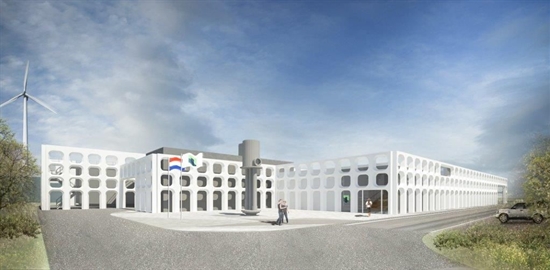The Rijn en IJssel Water Authority will extract the new raw material NEO-alginaat (grondstof voor bioplastic met daarin alginezuur, kan gewonnen worden uit organisch afval) from the residual water from FrieslandCampina's dairy production sites in Lochem and Borculo.
On November 8, the General Board of the Water Authority approved an investment of €11 million in the construction of a NEO alginate plant. In addition to producing the sustainable and unique raw material NEO alginate, the plant purifies the residual water and produces a quarter less sludge waste. Construction on the De Mars industrial estate in Zutphen is expected to start in the spring of 2017.
Special contribution to the circular economy
Kaumera is a sustainable raw material with a number of unique properties. It can retain water but also repel it. This offers various possibilities for application in, for example, agriculture and horticulture, the paper industry and the construction sector.
Dijkgraaf Hein Pieper, Rijn and IJssel Water Authority:
sThe Dutch Water Authorities spend a vast amount of money each year on waste water treatment. Moreover, valuable energy and raw materials are often lost with this waste water. That is why we work hard with universities, knowledge institutes and companies to purify the water of the future: Energy and Raw Materials factories that produce no waste and are energy-neutral. In this way we are working ever further towards a fully sustainable and circular economy.
Planning and design of NEO alginate plant
This decision by the General Board of the Water Authority and the cooperation with FrieslandCampina will enable construction to commence. This will be done in phases. Once the permit process has been completed, construction of the Nereda® is expected to start in the spring of 2017.

Artist impression NEO-Alginaatfabriek Zutphen
A world first
The Rijn en IJssel Water Authority, together with Royal HaskoningDHV, Delft University of Technology, Stichting Toegepast Onderzoek Waterbeheer (STOWA (stichting onderzoek waterschappen)) and the Vallei en Veluwe Water Authority, has been conducting intensive research into the extraction, production and application of NEO alginate for several years now. Subsidies from the Province of Gelderland and the Ministry of Economic Affairs help to carry out the research and to bear the risk of a first application.
This innovation is now being put into practice by the construction of the NEO alginate plant in Zutphen - a world first. In cooperation with the industry, the company is also exploring new applications for the product. Discussions with potential customers are now underway.
NEO alginate can be used as a thickener/glue, coating and stabilizer. Until now, alginate has been extracted from seaweed in China. It is therefore used to a limited extent in the medical world (denture mould, alginate plasters and cough medicine). By cleverly combining existing and new techniques, alginate can now also be extracted in the Netherlands. Namely from the sludge granules that are formed during a Nereda® purification process. This new NEO alginate (generated with Nereda® technology) can be marketed in a more sustainable, cheaper and more versatile way.
Cooperation with FrieslandCampina
Royal FrieslandCampina N.V. has two production locations in the working area of the Rijn and IJssel Water Board: Borculo and Lochem. At the end of 2017, the residual water from both dairies will be discharged via pressure pipes to the new Nereda® treatment plant in Zutphen.
The water is purified and NEO alginate extracted from the sludge. Both parties want to contribute to a sustainable society through this cooperation.